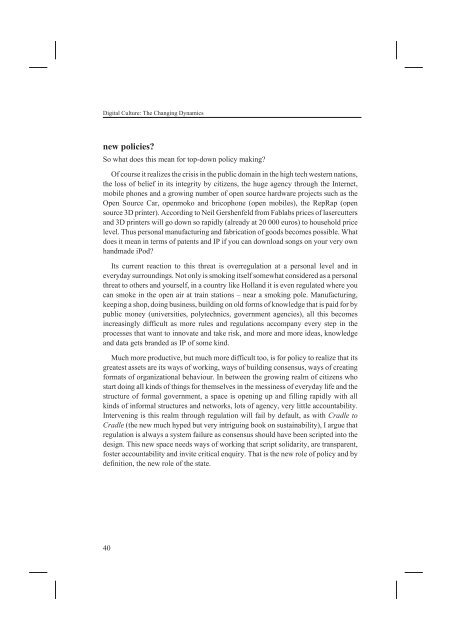D:\Documents and Settings\Ana\My Documents\Biserka-knjiga ...
D:\Documents and Settings\Ana\My Documents\Biserka-knjiga ...
D:\Documents and Settings\Ana\My Documents\Biserka-knjiga ...
You also want an ePaper? Increase the reach of your titles
YUMPU automatically turns print PDFs into web optimized ePapers that Google loves.
Digital Culture: The Changing Dynamics<br />
new policies?<br />
So what does this mean for top-down policy making?<br />
Of course it realizes the crisis in the public domain in the high tech western nations,<br />
the loss of belief in its integrity by citizens, the huge agency through the Internet,<br />
mobile phones <strong>and</strong> a growing number of open source hardware projects such as the<br />
Open Source Car, openmoko <strong>and</strong> bricophone (open mobiles), the RepRap (open<br />
source 3D printer). According to Neil Gershenfeld from Fablabs prices of lasercutters<br />
<strong>and</strong> 3D printers will go down so rapidly (already at 20 000 euros) to household price<br />
level. Thus personal manufacturing <strong>and</strong> fabrication of goods becomes possible. What<br />
does it mean in terms of patents <strong>and</strong> IP if you can download songs on your very own<br />
h<strong>and</strong>made iPod?<br />
Its current reaction to this threat is overregulation at a personal level <strong>and</strong> in<br />
everyday surroundings. Not only is smoking itself somewhat considered as a personal<br />
threat to others <strong>and</strong> yourself, in a country like Holl<strong>and</strong> it is even regulated where you<br />
can smoke in the open air at train stations – near a smoking pole. Manufacturing,<br />
keeping a shop, doing business, building on old forms of knowledge that is paid for by<br />
public money (universities, polytechnics, government agencies), all this becomes<br />
increasingly difficult as more rules <strong>and</strong> regulations accompany every step in the<br />
processes that want to innovate <strong>and</strong> take risk, <strong>and</strong> more <strong>and</strong> more ideas, knowledge<br />
<strong>and</strong> data gets br<strong>and</strong>ed as IP of some kind.<br />
Much more productive, but much more difficult too, is for policy to realize that its<br />
greatest assets are its ways of working, ways of building consensus, ways of creating<br />
formats of organizational behaviour. In between the growing realm of citizens who<br />
start doing all kinds of things for themselves in the messiness of everyday life <strong>and</strong> the<br />
structure of formal government, a space is opening up <strong>and</strong> filling rapidly with all<br />
kinds of informal structures <strong>and</strong> networks, lots of agency, very little accountability.<br />
Intervening is this realm through regulation will fail by default, as with Cradle to<br />
Cradle (the new much hyped but very intriguing book on sustainability), I argue that<br />
regulation is always a system failure as consensus should have been scripted into the<br />
design. This new space needs ways of working that script solidarity, are transparent,<br />
foster accountability <strong>and</strong> invite critical enquiry. That is the new role of policy <strong>and</strong> by<br />
definition, the new role of the state.<br />
40



